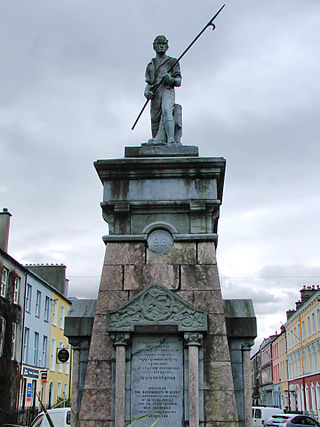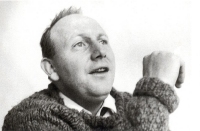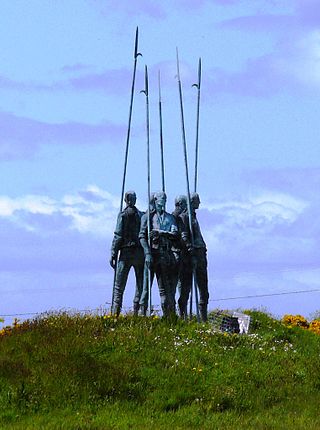
The Irish Rebellion of 1798 was a popular insurrection against the British Crown in what was then the separate, but subordinate, Kingdom of Ireland. The main organising force was the Society of United Irishmen. First formed in Belfast by Presbyterians opposed to the landed Anglican establishment, the Society, despairing of reform, sought to secure a republic through a revolutionary union with the country's Catholic majority. The grievances of a rack-rented tenantry drove recruitment.

The Battle of Vinegar Hill was a military engagement during the Irish Rebellion of 1798 on 21 June 1798 between a force of approximately 13,000 government troops under the command of Gerard Lake and 16,000 United Irishmen rebels led by Anthony Perry. The battle, a major rebel defeat, took place on 21 June 1798 on a large rebel camp on Vinegar Hill and in the streets of Enniscorthy, County Wexford and marked the last major attempt by the rebels to hold and control territory taken in Wexford.

Pitchcapping is a form of torture which involves pouring hot pitch or tar into a conical paper cap and forcing it onto an individual's head, which is then allowed to cool before being rapidly removed. Typically, victims of pitchcapping suffer loss of skin and tissue around their head. The practise of pitchcapping dates back to the period of classical antiquity, but was used most prominently during the suppression of the Irish Rebellion of 1798. Pitchcapping was usually preceded by the hasty shaving of the victim's hair, and the effect it had resembled scalping in the injuries inflicted. In other forms of pitchcapping, pitch or tar was poured into the victim's orifices instead, though since doing so invariably proved fatal, this was more akin to a form of execution instead. Another form of pitchcapping involved smearing cloth or a piece of paper with pitch and pressing it onto the head of the victim.

Croppy was a nickname given to United Irishmen rebels during the Irish Rebellion of 1798 against British rule in Ireland.
"The Wearing of the Green" is an Irish street ballad lamenting the repression of supporters of the Irish Rebellion of 1798. It is to an old Irish air, and many versions of the lyric exist, the best-known being by Dion Boucicault. The song proclaims that "they are hanging men and women for the wearing of the green".

Frank Harte was a traditional Irish singer, song collector, architect and lecturer. He was born in Chapelizod, County Dublin, and raised in Dublin. His father, Peter Harte, who had moved from a farming background in Sligo, owned 'The Tap' pub in Chapelizod.

Joseph Holt was a United Irish general and leader of a large guerrilla force which fought against British troops in County Wicklow from June–October 1798. He was exiled in 1799 to the colony of New South Wales where he worked as a farm manager for NSW Corp Paymaster Captain William Cox and later returned to Ireland in 1814.
"The Wind That Shakes the Barley" is an Irish ballad written by Robert Dwyer Joyce (1836–1883), a Limerick-born poet and professor of English literature. The song is written from the perspective of a doomed young Wexford rebel who is about to sacrifice his relationship with his loved one and plunge into the cauldron of violence associated with the 1798 rebellion in Ireland. The references to barley in the song derive from the fact that the rebels frequently carried barley or oats in their pockets as provisions for when on the march. This gave rise to the post-rebellion phenomenon of barley growing and marking the "croppy-holes," unmarked mass graves into which rebel casualties were thrown. To many Irish nationalists, these "croppy-holes" symbolised the regenerative nature of resistance to British rule in Ireland. Barley growing every spring was said by nationalists authors to symbolize continuous Irish resistance to British rule, particularly in nationalist literature and poetry written about the rebellion.

John Murphy was an Irish Roman Catholic priest of the Roman Catholic Diocese of Ferns, who is mainly remembered for his central role in the Irish Rebellion of 1798 in County Wexford, which is sometimes known as the Wexford Rebellion. He led the rebels to one of their initial victories over a government militia at Oulart Hill, and in the following weeks became one of the rebellion's main leaders.

MylesByrne was an insurgent leader in Wexford in the Irish Rebellion of 1798 and a fighter in the continued guerrilla struggle against British Crown forces in the Wicklow Hills until 1802. In 1803 collaborated closely with Robert Emmet in plans for a renewed insurrection in Dublin. After these misfired, he took a commission in Napoleon’s Irish Legion, seeing action in the Low Countries, Spain and at the Battle of Leipzig. Under the Bourbon Restoration he was deployed to Greece, and retired as a chef de bataillon. In his later years, he was the Paris correspondent for the Young Irelander paper The Nation, and dictated his memoirs. In these, he advanced the image of the United Irishmen as a cohesive revolutionary organisation dedicated to the achievement of a national democratic government.
"Boolavogue" is an Irish ballad commemorating the campaign of Father John Murphy and his army in County Wexford during the Irish Rebellion of 1798. It was composed by Patrick Joseph McCall in 1898, the centenary of the Rebellion.

The Wexford Rebellion refers to the events of the Irish Rebellion of 1798 in County Wexford. From 27 May until 21 June 1798, Society of United Irishmen rebels revolted against British rule in the county, engaging in multiple confrontations with Crown forces. The most successful and destructive rising in all the counties of Ireland, United Irishmen rebels experienced a number of early successes in the county despite being seen as a relatively loyal county by the Dublin Castle administration due to a series of military victories. However, the tide soon turned against the United Irishmen in Wexford as Crown forces poured into the region, engaging in a brutal counterinsurgency which indiscriminately targeted suspected rebels and eventually suppressed all rebel activities in the county.
Thomas Cloney was a United Irishman, and leader of the rebellion in County Wexford in 1798, and with Robert Emmet a co-conspirator in the attempt to renew the republican insurrection in 1803.

Dublin Street Songs and Through Dublin City are LPs of mostly traditional Irish songs by Frank Harte. Dublin Street Songs was Frank Harte's first LP recording in 1967, having been recorded in two days earlier that year by Bill Leader in the UK at the same time as the tracks that were to become Through Dublin City, which was issued on the Topic label in 1973.

1798 – The First Year of Liberty is an album of traditional Irish songs relating to the 1798 rebellion by the United Irishmen. All songs are sung by Frank Harte and some are accompanied on bouzouki, guitar and occasional bodhrán by Donal Lunny.
Jimmy Murphy also known as 'Little Jimmy Murphy' is a song, possibly of music-hall origin, referencing the 1798 rebellion, which occurred largely in Wexford.
"The Croppy Boy" is an Irish ballad set in 1798 rising relating to the despair of a doomed young "croppy" or rebel.
"Foggy Dew" is the name of several Irish ballads, and of an Irish lament. The most popular song of that name chronicles the Easter Rising of 1916, and encourages Irishmen to fight for the cause of Ireland, rather than for the British Empire, as so many young men were doing in World War I.